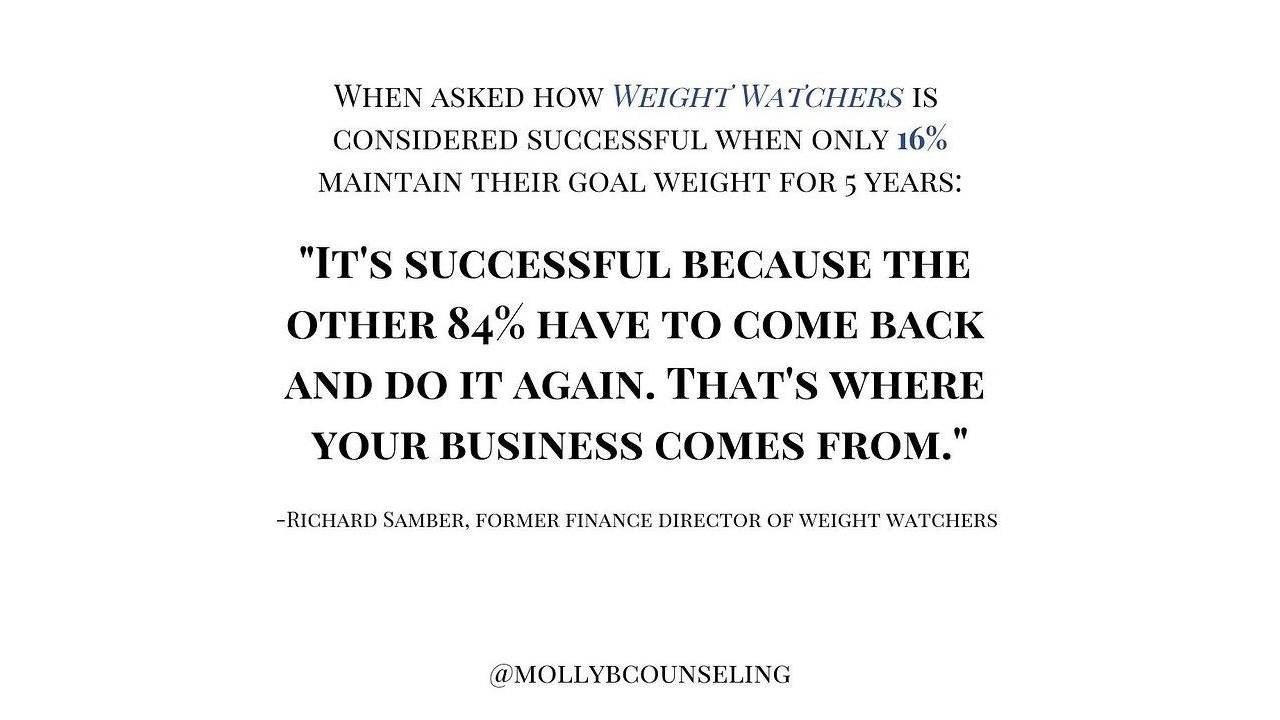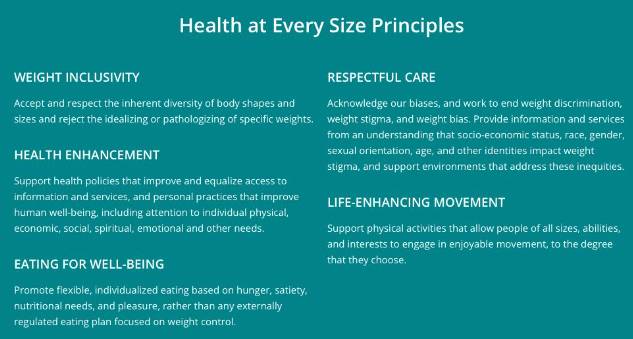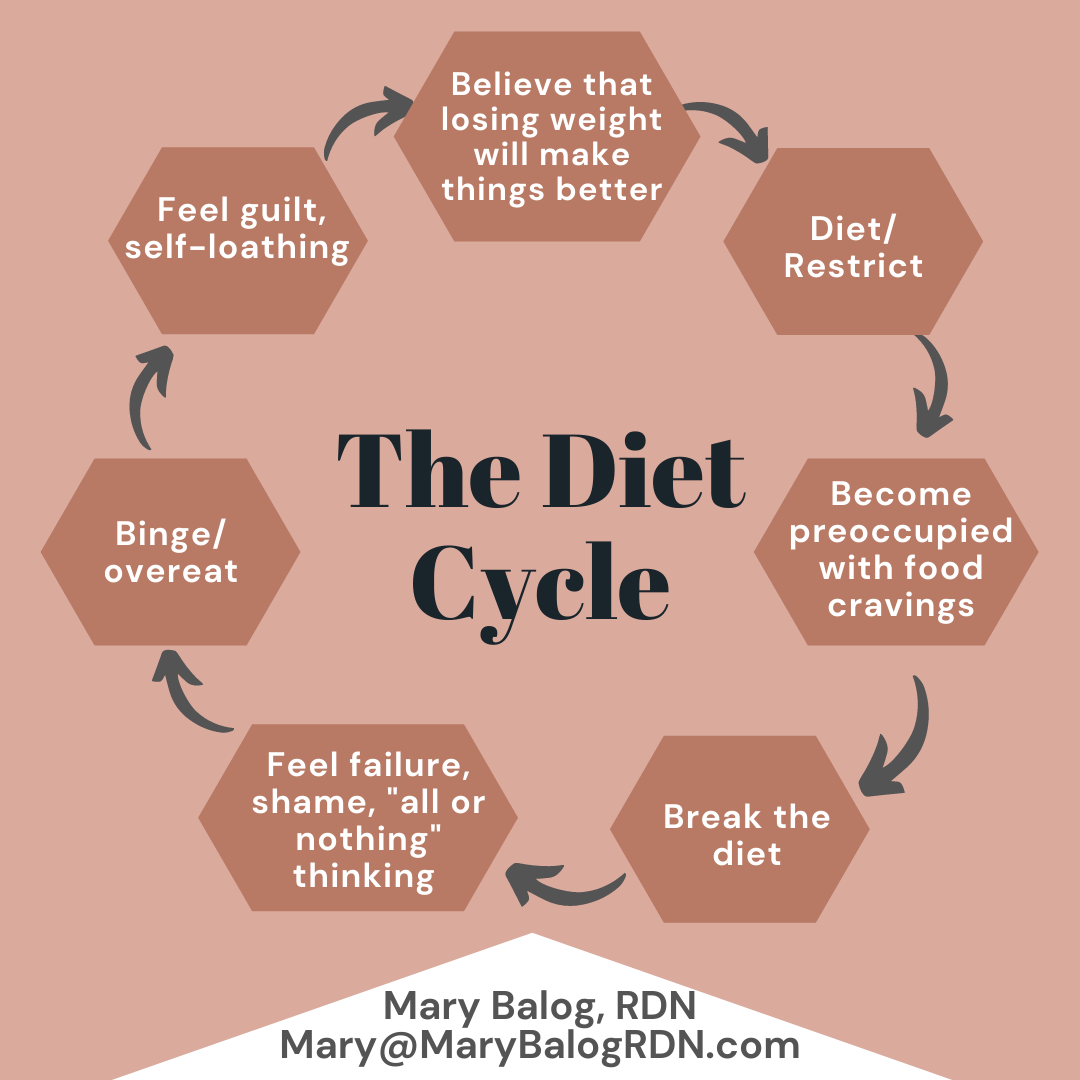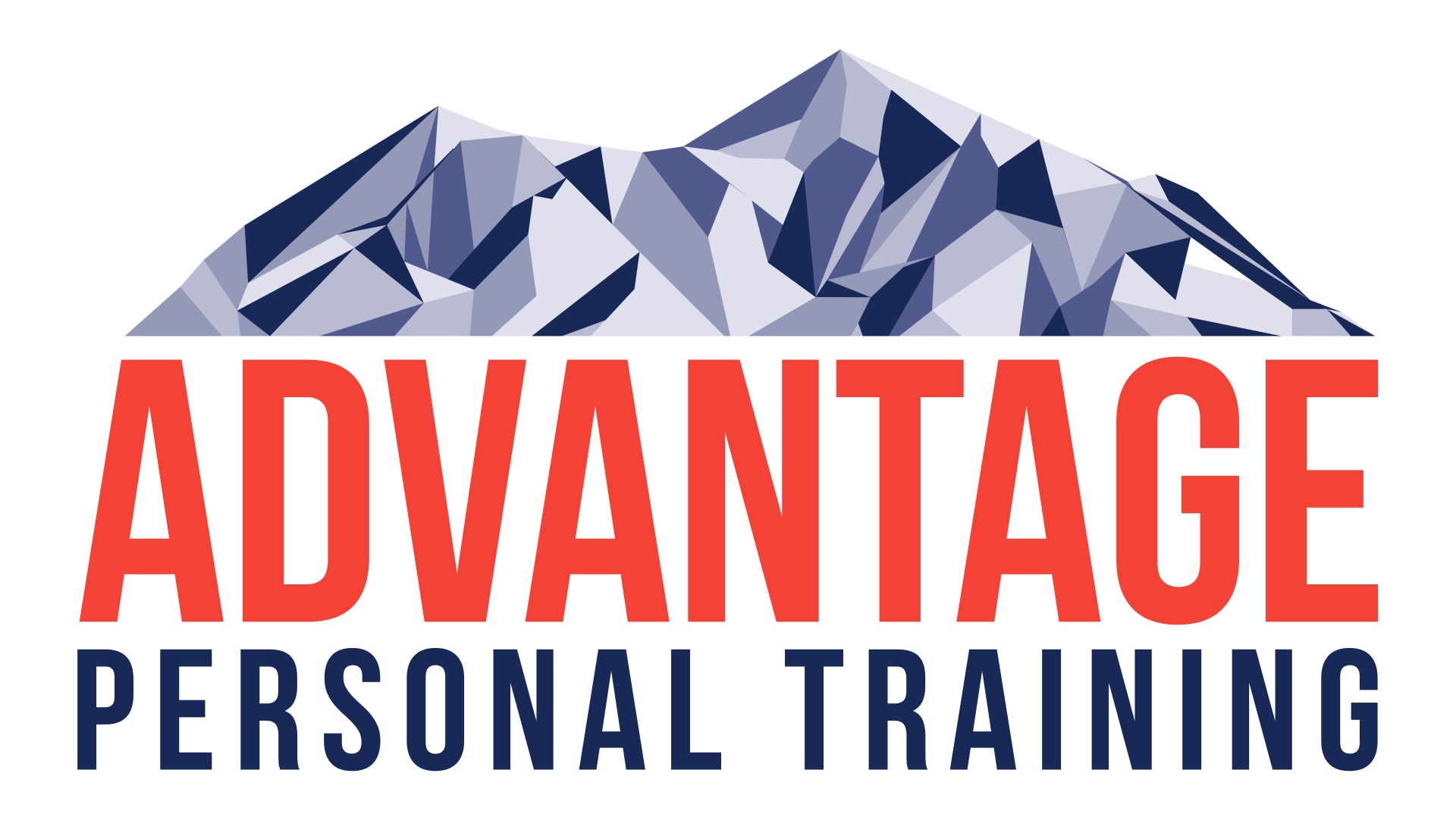What They Don’t Tell You About Dieting
So far I’ve introduced a little about the “non-diet” approach, as well as the Diet Cycle, which many people find themselves stuck in when using a restrictive “diet” approach to food and health. For some of those people, the idea of eating what they love and “giving up” on diet or weight loss doesn’t seem like an option, understandably. We face a LOT of pressure, day after day, to eat “clean” and lose weight. That pressure may come from well-intentioned family, friends, and healthcare professionals who are concerned about our health (more on that later); or from fear-inducing headlines that compare sugar to poison; or from photo-shopped & face-tuned ads on Instagram of celebrities selling their flat tummy tea or shapewear. We are surrounded by Diet Culture, and are forced to engage with it- no matter if it’s coming from our loved ones, acquaintances, coworkers, or even strangers.
What exactly is Diet Culture? You might have an idea just from the sound of it... Messaging that promotes diet & weight loss. Right? It’s actually more than that. Here’s a definition from Aubrey Gordon, author of “What We Don’t Talk About When We Talk About Fat”:
- Diet Culture: “A system of cultural beliefs and practices that equates thinness not just with health, but with moral virtue, and which advocates for weight loss at any cost. Diet culture isn’t just a matter of being on a diet, but of the social forces that make dieting (or lifestyle changes or wellness) culturally mandatory for so many of us.”
The key phrases are “moral virtue” and “weight loss at any cost”. Diet culture doesn’t only convince us that weight loss is necessary (to be beautiful, to demonstrate our worth, or to be healthy); but it creates this pressure that we are MORALLY obligated to do so. In order to be perceived as good, responsible people, Diet Culture urges us to pursue weight loss at any cost- which could mean sacrificing our social life, a significant amount of money on supplements or meal replacements or programs, our emotional wellbeing, and even our physical wellbeing. Maybe diet and weight loss aren’t so healthy after all…
And while this may not be everyone’s experience, we have research that demonstrates the following emotional impacts of restrictive dieting:
- Dieting is associated with higher anxiety levels (Kwasnicka, 2020)
- Dieting is associated with poorer emotional and mental quality of life (Burns etal, 2001)
- Dieting is linked with reduced life satisfaction (Esch and Zullig, 2013)
Further, restrictive dieting has actually been found to cause weight GAIN. To be clear, weight gain is nothing to be ashamed about (bodies change!); but if the multibillion dollar diet industry is selling a diet plan for weight loss, they’re not exactly being honest about the likely outcomes.
- 1⁄3 to 2⁄3 regained weight within 1 year, with almost all weight regained within 5 years (1992 NIH Consensus)
- Most weight is gained back within 2 years and most gained back all the weight by 5 years (2013 Australian Research Council)
- A team of UCLA researchers reviewed 31 long term studies on the effectiveness of dieting and concluded that dieting is a consistent predictor of weight gain—up to two-thirds of the people regained more weight than they lost (Mann 2007)
This quote from Weight Watchers former Finance Director sums it up pretty well:

The resulting effect of repeated dieting and weight loss attempts can lead to weight cycling (or repeated bouts of weight loss & regain), which is very stressful on the body; and it also reinforces the “thin ideal” which perpetuates weight stigma (or discriminatory acts and ideologies targeted towards individuals because of their weight and size).
- Weight cycling also has negative mental- and physical-health effects, independent of BMI. It’s associated with the following undesirable outcomes (Tylka et al. 2014): Higher mortality; Higher risk of osteoporotic fractures; Higher risk of gallstone attacks; Loss of muscle tissue; Chronic inflammation; Some forms of cancer; Hypertension ; Cardiovascular disease ; Diabetes (Park et al. 2019)
- Weight stigma is “Positively associated with ob*sity, diabetes risk, cortisol levels, oxidative stress level,C-reactive protein level, sleeping disturbances, depression, anxiety, body image dissatisfaction and negatively associated with self-esteem among overweight and ob*se adults.” (Wu, YK., Berry, DC., 2018)
We know now that weight cycling & weight stigma are risk factors for health issues, independent of BMI (meaning, when controlling for BMI, researchers still found correlations with weight stigma or weight cycling and undesirable health outcomes). These are third factors which had been overlooked for so long. We used to think it was the weight itself that was the issue, but that is confounded by the effects of weight cycling and weight stigma- which many people in larger bodies struggle with, due to the ongoing pressure to lose weight and unfair judgment they face when they don’t. Our society prioritizes thinness, and the “appearance” of health, over actual health & wellbeing; and that obligation to lose weight is creating unfair circumstances for people who are naturally in larger bodies (or who then gain weight as a result of repeated restrictive diets).
Now, some of you may be thinking, well what about small minor changes? What about “lifestyle changes”? Are there less extreme measures I can take to lose weight?
Unfortunately, many studies that demonstrate weight loss do not necessarily monitor their participants for longer than 2 years (which is usually the point where folks begin to regain weight). This means there isn’t a definitive solution for sustained weight loss.
Further, 35% of dieters will progress into disordered eating; and 30-45% of those dieters will progress into a full blown eating disorder (Shisslak & Crago, 1995). Considering how many people are on some kind of diet at any given time, it’s not a surprise that Eating Disorder rates have DOUBLED from 2000-2006 to 2013-2018 (Galmiche et al, 2019). Knowing these risks, I would not recommend restriction in any sense. It’s a slippery slope. It’s also not necessary when we know that Weight-neutral behavioral interventions have been shown to be more effective for people of all sizes. “Researchers Glenn Gaesser and Siddhartha Angadi looked at 225 different studies and meta-analyses and found that behavioral interventions show far more success in improving fat people’s health, and carry far less risk than intentional weight-loss attempts.” (Christy Harrison)
Weight-neutral means that weight isn’t the focus; so while weight loss might be a byproduct of implementing healthy behaviors, it’s not the main motivator. Anytime a client begins work with me, I tell them that three things can happen: They can gain weight, lose weight, or maintain their weight. But rather than focus on the number on the scale, we explore behaviors related to Intuitive Eating or Health at Every Size(seen below):

So where do we go from here? This can be a lot of information to take in… or it may totally affirm your personal experience with dieting! Whatever the case, it’s important to know all the risks when deciding what’s right for you. For anyone who feels validated by this research and frustrated with diets and weight management, just know that you are not to blame. In future newsletters, I’ll share more about the biological side effects of restriction.
But for now, the first step is to practice cultivating self-compassion towards yourself. Everything you’ve chosen to do up to this point was in your best interest! And whatever has transpired, you can move forward and choose body respect, food for nourishment, movement as a form of self-care, and maintain a sense of curious non-judgement about your choices & behaviors.
If you want more guidance or have questions, please don’t hesitate to contact me. To set up a free 30-minute Discovery call, send me an e-mail at [email protected], and include “Advantage Strength Discovery Call” in the subject line.
Until next time!
What I’m listening to: Setting the Table: The Great Migration and Black Foodways by Whetstone Radio Collective
What I’m cooking: Pork tacos!
Mary is a Registered Dietitian-Nutritionist and Certified Intuitive Eating Counselor currently working in partnership with Advantage Strength to offer Nutrition services. Her background is in clinical nutrition, local food systems, and culinary arts. Her goal is to help enhance your relationship to your food, your body, and your community. To learn more, visit www.marybalogrdn.com (or stay tuned for more newsletter content!).




Advantage Personal Training is an Ann Arbor based Family Oriented Gym, focusing on the training needs of individuals, small groups and youth athletes. Meet with a results-oriented personal trainer and put yourself on the path to a more active life!
SERVICES
CONTACT INFORMATION
Hours of Operation
Mon to Fri: 6:00 AM - 8:30 PM
Sat: 8:30 AM - 12:30 PM
Sun: CLOSED
All Rights Reserved | Advantage Personal Training

